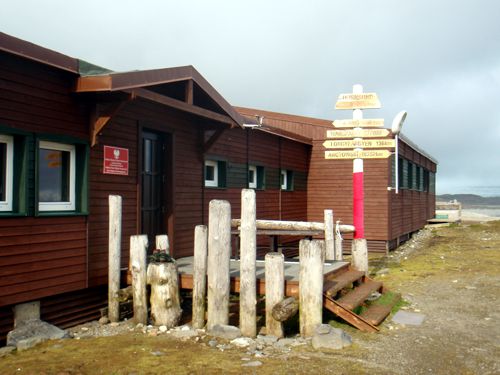A few days ago, it was already “hump day”. This is a custom taken from long surveys on ships, where people use the analogy of the camel hump to mark the days “up”, toward the middle of the survey, or the hump, and the days “down”, where each day takes us closer to the end, but also to the return to normal life, to family and loved ones, to the favourite pub down the road or to the comforts of home and the choice of our own food or our own entertainments.
In the past, I have been on rather long surveys, for two months or more, and “hump day” is often marked by a more or less official (and more or less unbridled) celebration. Here, this is more of a muted affair. First, because our team of three is the only one for which this is “hump day”: the others are here for longer, or shorter, or started at different times. Second, because we luckily get on well together, and the Polish Polar Station is much more homely than a deep-sea vessel. I love going on ships, and the excitement of scientific discovery as we survey new grounds is hard to surpass. But one must admit that, after a while, we are still all bundled together for several weeks in very confined spaces, with hard work and very limited entertainment. And it’s impossible to “step outside” to be alone, or oneself, for a change.

The Polish station has access to the outside world: I can Skype with my family on a regular basis, receive and send emails and we also have access to satellite TV. Granted, the network speed is very slow: I sometimes see letters appearing on the screen 5-15 seconds after typing them, and Skype conversations often have to be audio-only because of the limited bandwidth. The satellite connection is sometimes down when the weather turns bad, or when the connection at the other end fails to recognise internet addresses (“bath.ac.uk: host cannot be resolved”). But this is still better than no connection, and being cut off from the rest of the world for months on end. We can follow the heat wave in Europe (and feel very happy for our own “heat wave”, with temperatures as high as 5 degrees), and other international affairs.
And, contrary to ships, the fact we do not work on shifts means we have more freedom to get a break every now and then. The Station has a well-stocked bookshelf. Most of it is in Polish, obviously, but there are other books given by visitors over the years, in other languages. A book by Julian Dowdeswell (a famous polar explorer and scientist, now based in Bristol) is on the same shelf as “The Guide to Mammals and Birds from Svalbard”, from the Norwegian Polar Institute, not to be confused with “The Guide to Flora and Fauna from Svalbard”, translated from Polish and giving the best directions for collecting and storing specimens, from plankton to parasites to larger sample. The TV is often switched on in the communal area, allowing us to see Harry Potter (in Polish), Iranian children’s programmes (one of the scientists here is learning Farsi in his spare time), or any satellite channel we please. Obviously, with the pace of work I haven’t had much time to watch it much (a few minutes at most). But, like the Opera in Sydney, knowing it’s there if you want to access it always makes us feel better.
Another factor that makes life better, even if working hard and being away from home for long, is the food. Here, we are lucky to have two chefs (Piotr and Daria), helped by a few scientists on roster duty each day. The food is varied, appetising, and includes both traditional Polish fare (from beetroot juice to beetroot soup to varied types of sausages) and different offerings (Chinese food two days ago, pancakes this morning, and even homemade pâté two weeks ago). The meals are set on the communal table, sitting 20 people at a time (there are often two sittings, when everybody is here) and leftovers are available in the fridge, for evening dinners (at no fixed time, although we all tend to meet around the coffee machine around 8-9 pm) and anytime cravings.
Respond